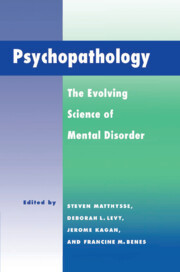Book contents
- Frontmatter
- Contents
- List of Contributors
- Preface
- Brain mechanisms
- 1 Editor's introduction: From controversy to connectivity
- 2 The functional parcellation of dorsolateral prefrontal cortex and the heterogeneous facets of schizophrenia
- 3 Components of working memory deficit in schizophrenia
- 4 Temporal lobe structural abnormalities in schizophrenia: A selective review and presentation of new magnetic resonance findings
- 5 Location, location, location: The pathway from behavior to brain locus in schizophrenia
- 6 The defects of affect and attention in schizophrenia: A possible neuroanatomical substrate
- Development
- Thinking
- Genetics
- Response and reflections
- Author index
- Subject index
6 - The defects of affect and attention in schizophrenia: A possible neuroanatomical substrate
Published online by Cambridge University Press: 04 May 2010
- Frontmatter
- Contents
- List of Contributors
- Preface
- Brain mechanisms
- 1 Editor's introduction: From controversy to connectivity
- 2 The functional parcellation of dorsolateral prefrontal cortex and the heterogeneous facets of schizophrenia
- 3 Components of working memory deficit in schizophrenia
- 4 Temporal lobe structural abnormalities in schizophrenia: A selective review and presentation of new magnetic resonance findings
- 5 Location, location, location: The pathway from behavior to brain locus in schizophrenia
- 6 The defects of affect and attention in schizophrenia: A possible neuroanatomical substrate
- Development
- Thinking
- Genetics
- Response and reflections
- Author index
- Subject index
Summary
Where affect is lacking, there will also be lacking the drive to pursue the external and internal processes, to direct the path of the senses and the thoughts, i.e. active attention will be lacking.
Bleuler, 1950Introduction
Two of the “core” defects found in schizophrenia are disturbances in affective experience and attention. On the one hand, schizophrenics commonly report having no emotions, other than the occasional experience of anger, leading some to describe themselves as feeling “dead” or “numb.” On the other hand, an attentional defect seen early in the course of the illness (McGhie and Chapman, 1963) involves a loss of selectivity or “overinclusiveness” (Detre and Jarecki, 1968) that is believed to involve a loss of a central filter mechanism (Cameron, 1938). Although both affective experience and attention are essential to normal functioning, the basic neurophysiology of these functions have not been extensively investigated and consequently are not well-understood aspects of behavior. It is important to understand more about the ways in which emotional expression and selective attention are centrally processed, because such insights may provide some clues regarding the pathophysiology of schizophrenia. The concurrence of affective and attentional disturbances in this disorder may suggest that these two aspects of normal behavior are processed through similar or overlapping circuits.
- Type
- Chapter
- Information
- PsychopathologyThe Evolving Science of Mental Disorder, pp. 127 - 152Publisher: Cambridge University PressPrint publication year: 1996
- 5
- Cited by



